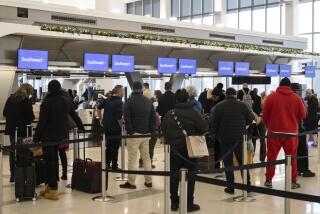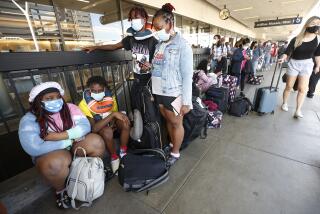One More Step for Safe Skies
- Share via
After Sept. 11, the government and airlines properly rushed to institute sweeping security measures to restore public confidence in flying. But the hours-long lines and delays created by random searches of passengers are not enhancing security. Homeland Security Director Thomas J. Ridge is correctly urging that the airlines and government move quickly to establish a “trusted fliers” program that would both speed up travel and bolster security checks.
As Ridge outlined the program Monday, the airlines would create a card to be issued to passengers who voluntarily joined a “trusted flier” program and paid a modest fee. Passengers would supply extensive background information showing they did not pose a security risk, and the airlines could use commercial databases to double-check identities. Once cleared, the trusted fliers would receive a card containing a biometric identifier so that no one else could use it; biometric identifiers used elsewhere have included fingerprints and iris scans. The process would allow the screeners to devote their major resources to focusing on the potential bad apples.
The Air Transport Assn. of America, which represents the major airlines, has endorsed such a program but wants the federal government, not industry, to run it. It also wants aviation officials to have access to government data, including arrest records and customs files. A database program of this kind is already in use in Israel, where El Al, the national airline, checks government intelligence records for each passenger.
One objection to systems like this comes from civil libertarians who oppose checking passengers against databases as a step toward Big Brother. But the airlines are already using the Federal Aviation Administration’s “computer-assisted passenger prescreening system,” which matches passengers to a profile of suspicious activity. Moving toward a card would create a more refined system, and it would, of course, be voluntary.
Another cautionary note comes from John Magaw, chief of the new Transportation Security Administration, who worries that a terrorist might devote several years to establishing a frequent-flier background that appears trustworthy. But occasional rigorous checks of “trusted fliers” might help improve the odds against this, and no system is going to be perfect. A government-run program, which has the powerful databases that the airlines lack, should be tested immediately.
More to Read
Inside the business of entertainment
The Wide Shot brings you news, analysis and insights on everything from streaming wars to production — and what it all means for the future.
You may occasionally receive promotional content from the Los Angeles Times.










